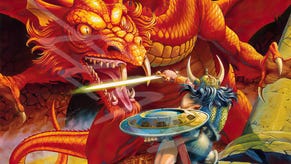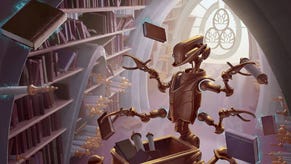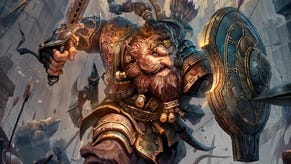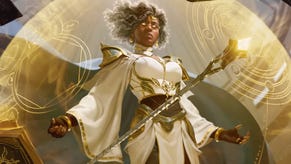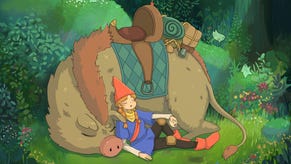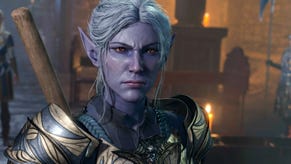Dicebreaker Answers: Your top questions about Dungeons & Dragons!
Gain +1 INT.
You had questions about Dungeons & Dragons you wanted answering, and we here at Dicebreaker were just the people to answer them!
Earlier this week, we launched our new Ask Dicebreaker feature by opening the floor to your burning queries about Dungeons & Dragons. Now it’s time to introduce the companion to Ask Dicebreaker - Dicebreaker Answers!
Yes, the Dicebreaker team has picked out the top questions we received about how to play Dungeons & Dragons 5E and our opinion on various other parts of the OG fantasy RPG, from how to get new players started to the unwanted rules we’d consign to the deepest pits of Avernus.
Below you’ll find Johnny, Matt, Lolies, Meehan, Wheels and Sara revealing their personal experiences of DMing, advising when tropes can be a good thing, giving their tips on how to spice up combat and much more.
There were many more questions than we could answer, but you’ll find plenty more in-depth advice and guidance in our guides on how to play Dungeons & Dragons 5E, how to pick your character class in Dungeons & Dragons 5E and more. And if you have your own advice to offer, comment below with your D&D wisdom!
Ask Dicebreaker will return soon with another hot tabletop topic to discuss - let us know what you’d like help with in the comments section, and we might just help you out!
Schernobyl CIS115DK: What's the best way to get new players started? And how do you guide them away from the standard tropes common in character creation? i.e. We meet in a bar, or I'm the anti-social loner rogue raised by a pack of wolves since my parents were murdered when I was a young age.
Matt: I’ve found that tropes can be helpful for new players to avoid feeling overwhelmed by having to come up with something totally original the first time around, but you’re right that you don’t want the same old cliches to pop up. What can help is asking new roleplayers to draw from things they enjoy in other stories or characters and combine multiple different aspects together - even if they are tropes separately, sometimes melding them into one can create or inspire something fresh. And it’s also good to keep things relatively broad at first, so that there’s room for original ideas to spring up in later sessions - maybe the group does meet in a bar, but it takes place before the campaign begins and it’s not clear why they were there to begin with…
Sara: Haha! I know what you mean. With regards to start, a 'session zero' where you talk through rules and characters is a godsend. To be honest, if you don’t have it, odds are you’ll spend a lot of your first session correcting people’s character sheets. I believe tropes can serve as fantastic inspiration - bear in mind that people’s characters tend to evolve and change as the campaign goes on. One guy in one I play started out with a literal giant that just pets and stabs stuff. These days he’s a small business owner and political figure. However, I completely understand the “I am the grimdark rage boy who hates all and has daddy issues that require climbing to the top of tall buildings and monologuing trash anime dialogue” thing. One thing that I find helps with this is the “you want to be with the party” rule: however spooky-sad your character is, they have to have a reason for being with everyone else and, as such, need to learn to tolerate them. They can still write in a journal and shake their fists at the dark sun or whatever, but they can’t do that to the detriment of other people’s time, and they can’t just be like “Screw you guys, I don’t care” when combat hits. If you’re worried about someone’s character in that regard, a simple “this is a co-op game, so you can be your character, but mechanically speaking you can’t wander off all the time” works. When it comes to things like extensive monologuing, the awkward silence from the group that hits might be deterrent enough.
eleccy: I've only DM'd 3 times, all one-shot modules I've found online. How would I go about creating a short adventure from scratch?
Johnny: Work backwards and plan loosely! I like to start by working out what the final challenge facing the players will be - let’s say for the sake of argument it’s a duel with a nobleman in the middle of a society ball - and then ask myself questions as to how the adventurers get there. What’s this nobleman up to? Why are they trying to stop him? How are they going to get into the ball? I try not to plan too heavily at this stage as there’s no predicting what your players will do anyway - as long as you know what the final act looks like, you can relax about the stuff leading up to it.
Sara: It can be helpful to come up with a setting or theme you’d like to explore, like the Fey Wilds (where all the cursed fairies live) or pirates. Then pick a basic hook, that could be anything from finding an item to a missing person. Look at TV shows and short stories you enjoy. Work out their journey from A to B, then distinguish a primary antagonist - someone who wants to stop them doing the thing. Add highs and lows as appropriate. I think the most important thing is to find a world that resonates with you, and not get too caught up in details - as your players will ultimately do their own thing. You need to set the scene and spark off a few arcs, but no-one needs an extensive lore dump. I also want to emphasise that one-offs don’t have to be a traditional adventure. I’m currently running a homebrew campaign that started off from the one-off idea of “What would happen if we put Spinal Tap into D&D?” - cue rock band The Beholders trapped in the Fey Wilds. A one-off I recently played involved a group of us all competing to bid the highest on a rare artefact at a casino. It had barely any combat, and was predominantly intrigue, high-japes and miniature lizard racing. I’ve even heard of one-offs that involve being the politicians that run a city and murder-mysteries are becoming quite popular too. Remember it’s your world, and anything goes!
MorningFall: How to get into roleplaying and roleplay during battle?
Johnny: Talking is a free action, even in combat, so be talkative. I think players often assume it’s only worth saying something if they’re sharing tactical information about the fight, but there’s nothing to say you can’t say stuff for the sake of character while also trying to cleave an ettercap in twain. Take Inigo Montoya, for example - the most electrifying dialogue in The Princess Bride takes place during a frantic duel. Let him be your guide.
Meehan: Think about the situation you and your fellow party members are in - be it a desperate struggle against a powerful foe or a simple squabble with a random rat - and consider how your character would react to that. Taking in what these battles mean is as important as fighting in them, and interacting with them beyond just stabbing a wolf really helps with character growth. Is your character used to being in combat? If they’re just an average gnome suddenly fighting a golem, then they might even be terrified and crying throughout the fight.
Sara: Describe what you’re doing and why, if it’s relevant. Bursting into prayer, screaming to the skies and delivering dry one-liners are all possibilities. You’re all in full-scale adrenaline overload, so yeah, shit’s going to get weird.
Nom-Noms: What advice can you give to veteran players teaching new players? Johnny somehow herded those Oxventurer cats. I must learn his techniques.
Johnny: Step one: Acquire hip flask.
Matt: Just be flexible and allow new players to become comfortable with the game first and foremost. Allow for rules mistakes or story beats you may not agree with (this goes for players of all experience levels, mind). There’s nothing worse than someone being put off by their very first session, so being as welcoming of different ideas and play styles as possible is crucial. Over time, the group will find its shared level of comfort and storytelling - that’s part of what makes RPGs so fantastic.
David Gillam: If you could add a class or race that isn't already in 5E, what would you choose?
Matt: I’ve like to play as some sort of spirit that can only exist by possessing inanimate objects or other living creatures for a given amount of time. Sort of like the main character in the excellent video game Ghost Trick.
Sara: I’d really like a more occult-focused class, like a witch or some kind of spirit summoner - such as the ghost wrangler in Blades in the Dark.
Meehan: Bards are great, but I’d love to play as a class entirely designed around persuasion and empathy. Talking is my favourite part of D&D (which I’m sure surprises no-one) so I would want to translate that into a character that uses no weapon, just the power of their own voice.
Adrian: What, if any, house rules do you apply to your games?
Matt: It’s less a certain house rule and more a general sort of looseness with the rules - particularly in combat. If ignoring a certain roll/trait/specific rule makes for a more interesting story, I’m all for it.
Meehan: To try and let everyone have their own time to engage with the world, without completely dominating the game. It’s important to let every player get their turn, even the more quietly-spoken ones, so reminding everyone to be aware of that is important in D&D. Also, be nice to each other and be sure to be consider whether some players might be uncomfortable with certain sensitive topics.
Sordros: How do you make melee combat more exciting?
Johnny: I know where you’re coming from - “I hit it with my sword” isn’t exactly the most thrilling of actions. While it doesn’t affect the mechanics of the situation, I think an emphasis on colourful descriptions goes a long way when trying to jazz up combat. Speaking as a GM, I love describing fairly mundane attacks and trying to make them sound as cool as possible - whether that’s someone feinting to get past an enemy’s guard or simply smashing down their defences to cave in their ribs. Best of all though is telling a player how much damage they’ve done and then inviting them to describe what it looks like.
Sara: Vivid descriptions from the DM of what’s happened and - when it’s appropriate - saying: “Tell me how you kill them.” I don’t think I’ve met a player yet who didn’t get all excited by that one.
Kerri Maguire: How do you plan out homebrew campaigns? Do you focus on an overarching story and then tie smaller arcs in? Do you build a world, organise the politics and economics and go from there? Or do you wing it?
Matt: Some folks prefer to be a bit more rigorous with their planning, but I love to fly by the seat of my pants as a GM. Have a rough start and end scenario in mind, along with some general ideas of who and what might be in the world for the players to encounter - from there, let the players guide you and be ready to fill the gaps as you go along. I find that, for me, world-building is best when it comes from the whole group and is flexible enough to suit the players’ decisions - so I will only go deep into things like politics and economics if they specifically relate to that adventure or the characters’ place in the world.
Meehan: Please, please, please don’t create entire novel-worthy worlds before even starting your campaign. Being such an interactive and player-driven medium makes creating pre-written intricate worlds dangerous, as you never know what people will be interested in and how they’re going to react. Be sure to lay the groundwork of some key rules of your world and provide a unique little catch, just don’t get into the nitty gritty elements until your players have gotten their teeth stuck in - then you can build it outwards.
Luke Rettie: Do you prefer miniatures for battles or Theatre of the Mind? And official modules or homebrew campaign?
Lolies: For me, either works but I'm a very visual person so I do appreciate using miniatures because it helps me understand where everyone is in relation to to everything else. I can get a bit lost without them but that's not to say I think not using them is bad, I just find it ever so slightly harder to know what's what (mostly during combat though tbh!) Homebrew vs official: Again. I think both are equally valid, I like to mix it up!
Matt: Theatre of the Mind all the way for me - I find miniatures to be overly fiddly and (deliberately or not) put too much focus on sticking to the minutiae of the rules, particularly in combat situations. Miniatures can be handy to give a general idea of where characters are in the environment, but I’d rather just say “The monster is about 30 feet away” and let the players do what they want (within reason) than have them worry about move distances, specific attack ranges and so on. As for homebrew versus official, it comes down to the setting and scenario - sometimes it’s fun to pluck ideas from official campaigns and insert them into a world that better suits the tone and interests of the group, rather than feel beholden to the text.
Johnny: Hundred percent with Matt on this one - miniatures on the table draw too much of the players’ focus for my liking. I much prefer to have them looking at each other and enjoying the little moments that bubble up from a shared imagination.
Sara: I think it depends on the fight. With more standard combat I like to go Theatre of the Mind. However, it can be a lot of fun (and also a practical necessity) to have miniatures for larger-scale fights, especially if it’s a siege or something that involves area control. It gives people an easier time plotting out a combat strategy, plus gigantic monstrous miniatures can really up the ante in terms of atmosphere. And with homebrew and official, I have no preference! A lot of people homebrew official campaigns too. Some of the most fun I’ve had has been playing official campaigns like Curse of Strahd, but complete with loads of bits the DM has either created or included as part of overarching lore based on what players have done so far.
Ken Doyle: Why is bard the best class?
Wheels: *laughs in artificer*
Sara: I suspect this question might be a little leading! I would argue and say bard is not necessarily the best class; most bards end up in utility roles fight-wise, as they’re more like a jack of all trades (that’s even one of their skills) than a specialist - they do a lot of things well. Like the rogue, they get increased skills too, meaning they can do a LOT of stuff out of combat, while their (hopefully) decent charisma and DEX makes them both a good party ‘face’ and not too shabby at moving about. That said, I love playing bards for that reason. It’s definitely one of the most versatile classes in Dungeons & Dragons - you can do so much! They’re fun to build up in that sense too, because you have a lot of options of where you’re going to go with the character concept.
Meehan: Bards are fun to play because they encourage inspiration from the player. They’re not typically the best class to play combat-wise, especially in the first few levels, but it’s the way you utilise their tools in combat that matters. Spells such as Knock and Clairvoyance are super useful in general - but they can be applied during combat to turn the tide against a situation that could otherwise be fatal. They also get access to really fun spells like Pasha’s Hideous Laughter, which just adds so much personality to the class. They’re also renowned for being incredibly charismatic and benefit from memes surrounding their ability to fall into romantic subplots. (Believe me, I should know.)
Mythmage13: How do you find a group of people who you can play with? And does your character have to fall into an alignment? Or could I just be chaotic/lawful/neutral/good/evil, without combining them?
Lolies: A lot of tabletop shops/cafés will host D&D meet-ups these days which is a great start! I personally also used the MeetUp app previously to find groups to play with and had a great time! There's often also an opportunity to host your own in this case. Re: alignment, I always just see that as more of a guide/suggestion. I personally don't think you need to stick to one but it can be helpful to some when it comes to PC decision-making!
Wheels: Alignments are definitely something you can pretty much ignore in modern-day D&D. They’re a good basis for helping you make in-character decisions if you’re new to the system but real people don’t fall into a 3x3 grid so your more complex characters likely won’t either. It can be fun to mess with that system and play around with those ideas though; when I was designing Robert O’ Cop, my character in The Break Quest Club, I was inspired by what a character would be like if they pushed the lawful-good alignment to its absolute limit!
Sara: I found folks mostly through friends and acquaintances, then those people in turn suggested more people, and all of us eventually formed into different groups! In addition, online platform Roll20 also has classifieds for folks finding groups - I know people who have found groups that way too. I think it’s important to put feelers out; I was surprised by how many people I knew were curious about D&D. One guy in my group literally had zero nerdy interests prior - now he has about 50 sets of dice and regularly makes us homemade character sheets and dice towers! In my opinion, alignment really doesn’t matter that much. Your alignment will develop. I find it handy to have as a basis for a character, but beyond that I don’t religiously stick to it.
Martin Guttman: So, what is the best way to have challenging enemies for my players? I know there is the challenge number, but it's a bit confusing to me and with multiple enemies it gets worse, so any helping hand is welcome.
Johnny: My first-ever GM taught me a valuable lesson - if you want your players to feel powerful, throw one big enemy at them. If you want to actually hurt them, throw lots of weaker enemies at them. The more chances you give yourself to attack the players, the more likely you are to start doing damage - ignore the challenge rating and play around with what feels right. If you’ve overdone it, you could always have some enemies flee at a convenient moment. If they’re absolutely walking the encounter, you’ve always got the option to bring in reinforcements.
Sara: So obviously the CR gives you some idea (e.g. a CR4 can handle a party of four fourth-level adventurers) but, like you said, it can be hard to actually work out a proper figure. I think it’s good to have a loose plan, then alter as needed. I’ve had it where I’ve planned giant mobs of foes that I’ve reduced because it was clear no-one had a good shot at surviving! Another thing I find that helps is having a decently-powered NPC on the sidelines that can help. They mostly play as neutral, but if things get really bad they can throw a few spells in to balance it out, or if they’re powered up help the party escape with a dimension gate or similar. Additionally, a contingency is good; have plans for ways the party can escape, or ways more foes can turn up if the group crushes everyone. It’s an art, not a science, and every party is different.
Corfy: This is more of an Oxventure question for Johnny, but I've long wondered what he had to cut out/alter in "Bad Chair Day" to make up the time that Corazon and Merilwyn spent on the boat.
Johnny: A big old fight! The big bad confessed to his crimes pretty much immediately (while being choked by Prudence, if I’m remembering that correctly?) whereas originally I wanted him to go down fighting. Regrettably, with live shows, the big fight at the end always feels like a squeeze - I took pains to describe Giles Hawthorne as having a handsome duelling sword in Heist Society because I wanted him to challenge somebody to single combat for his honour, but there just wasn’t time. See also that time when the Oxventurers had five minutes to kill an actual god.
Twin229: What words of encouragement can you offer to people who claim they, "are not clever or creative enough" but want to start playing?
Lolies: I fall into that category tbh, especially playing on camera it feels like there's a lot of pressure to be funny and entertaining. I would say that you can play it as straight as you like! If you wanted you could create a character that is literally just you so when it comes to making decisions in game, you just need to think about "what would I do if I got attacked by a gang of goblins?" You could also share your concerns with the DM before you start. Hopefully they'd help/guide you and open options for you to be involved if you're being a bit quiet for example. Hope that helps!
Matt: Lolies’ advice is perfect, and I have to agree - I think most people feel a bit intimidating or unsure before they start playing. The amazing thing about RPGs is how they can bend to suit the players involved, so anyone can play - and because no people are alike, absolutely everyone has something interesting they can draw from to tell a unique story. In early sessions, it’s can be good to draw from things you already know well to not feel overwhelmed by choice - maybe you love Harry Potter, so you want to be a magic-user, or you enjoy listening to music, so a bard would suit you. Even if you start out feeling like you’re just drawing from other ideas, I think you’ll be surprised how quickly you make them your own. The best thing is to simply get started, and be open with the group about anything you want to ask.
Sara: All can play Dungeons & Dragons. EVERYONE. Even if you don’t consider yourself particularly outgoing or creative, you might be amazing at strategy, or fantastic at persuading NPCs, or just really good at hitting things with your axe. The important thing to bear in mind is that there are so many types of character, settings and things to do. For example, we have a ranger character in our party who is low charisma, but we literally would have died hundreds of times over without his brilliant survival skills. There is no “ideal” player, because it’s a co-operative game where everyone’s character matters. Basically, just give it a shot, and see what happens.
Dungeons&Dragons&Demons: Same question I always ask for D&D related things: Advice for playing complicated games like D&D with younger children? My daughter just turned 7, her and her 3 year old brother have been playing on and off for half a year. We keep sessions short and use lots of physical props like cards for spells and gems for health points and spell slots.
Matt: It sounds like you’re already doing the right things! Picking and choosing rules as you see fit is absolutely the way to go - that way, you can layer in slightly more complex ideas as the children grow comfortable with playing. There are also some great RPGs designed specifically for kids that are a nice step before D&D, such as the (surprisingly brilliant) My Little Pony RPG Tails of Equestria and No Thank You, Evil!, that might be worth taking a look at for inspiration even if you stick to D&D.
Sara: I believe there are children’s editions of Dungeons & Dragons that can help. Although it sounds like you are doing an amazing job so far! I think it’s so lovely when people get their younglings involved.
Jin_1814: What is/was your favorite PC or NPC that was heavily inspired by a character from pop culture?
Johnny: Every now and then I like playing as a character who’s basically Dale Cooper from Twin Peaks. It never gets old.
Wheels: Robert O’ Cop!!!!!
Sara: A character I played in Curse of Strahd was influenced by the King of Thieves from The Hunchback of Notre Dame. They cast illusions, shape-shift and do one heck of a mean lute performance.
Meehan: This isn’t a D&D answer, but it is an TRPG answer so I’m putting it in. We’re currently playing a Deadlands campaign, and my character is a super slimy snake oil salesman type inspired by Nigel West Dickens from Red Dead Redemption.
EricHVela: How would you rank the currently available Source Books beyond the essentials (PHB, DMG, MM)?
Sara: Xanathar’s Guide to Everything is a doozy. I would also recommend Volo’s if you want to play cat-people Tabaxi and/or lizardfolk. Sword Coast Adventurer’s Guide and Ravnica are fantastic if you like those settings.
EricHVela: Would you recommend any paper-less apps or sites to assist with D&D playing, especially over long distances? If so, which ones?
Johnny: D&D Beyond is very good for character sheets, especially since it crunches a lot of the numbers for you. Roll20 is good if you need to screen share/use maps online, too. My favourite is Discord - it’s really good for voice chat and you don’t need a chunky connection to make it work. Last year I ran a game over Discord in which one of our players was on his phone, in a caravan, at Glastonbury.
Jonathan White: How do you think the balances are in terms of races and classes in D&D 5E? Are there any races/classes you house-rule out of bounds because of somewhat overdone inherent powers/capabilities?
Wheels: I’d stray away from straight up banning any classes, especially in a roleplaying game. It’s good to remember that you’re not there to compete with each other; it’s all about letting your players play who they want to play and do what they want to do inside of the system you’re using. If you’re particularly worried about certain builds being too powerful in the adventures you’re playing, you can always tweak the adventure as a DM to provide challenges that that class won’t be prepared for. Say you’re playing some kind of modern-day RPG and a player has happened upon or created some kind of mega-rifle that annihilates anything you throw at it and they’re leaving the rest of the party behind. Chuck them in a Metal Gear Solid-style no-fire zone where a single shot could be catastrophic. A GM has loads of tools in their arsenal!
Sara: We don’t ban any classes or races, but we do advise folks not to play drow because of the old-school racist connotations. We also get very suspicious if someone’s like, “I am a lone edgelord with a dark past.” Regarding that, actually, the one character rule we have is: “You want to be with the party.” Like, you don’t have to like everyone in-character, but if you’re going to run off all the time doing stuff away from the group, it’s not fun, so you need a reason to be with the rest of the group, even if it’s just because you worked out that your survival odds are higher en masse.
AstrayJose: Wizards of the Coast have a variety of adventures module with each one being different: Waterdeep: Dungeon of the Mad Mage is a dungeon-crawl, Tomb of Annihilation is a hex crawl, Waterdeep: Dragon Heist is a faction/political intrigue-type. My question is which D&D game "style" is the most beginner-friendly and what is the best way to introduce players to these different types?
Sara: Waterdeep: Dragon Heist is an excellent introductory campaign because it fits into well-know fantasy tropes (sublimating them a little) and is not too deadly. This is less because of its faction/political intrigue aspects and more just that it has a nice mix of exploration and combat. The stakes aren’t too high at first also, which helps settle players into an atmosphere. In addition, I really recommend Curse of Strahd as a good one for folks who love horror. I think it’s less about what type of module it is, and more about what themes and activities your group would enjoy the most.
ElderlyGoose: I'd love to know how the hell you organise a game? Do you start with a date in mind and just stick to it regardless of what people can do? Or pick a few dates and times and work out a polling system? I've found it's the hardest part of D&D to get any game started.
Matt: It’s definitely tough! For me, I prefer to have everyone in the group in every session, so I won’t just stick to a date if someone can’t make it. Playing over Skype or other online tools such as Roll20 helps a lot compared to gathering everyone in the same room, as does trying to stick to a semi-regular schedule and announcing it upfront - “We’ll play on the first Friday of every month,” etc.
Sara: Haha! I know this well. We start with a date in mind, let people discuss whether that’s the one to go for, then eventually settle on a date after about six changes. The best you can do is just be on it like Sonic, so someone changes the date, and you’re like “OKAY GUYS, DOES THAT WORK FOR EVERYONE?” (hiding the creaking desperation in your voice). You’ll get there eventually. It’s also good to get an idea of people’s commitments, like their vague work hours, if they have kids, etc. We have a few people in our group who do shift work, so sometimes we start a little later to accommodate that.
Meehan: Polling systems do actually work very well in my experience. It’s important to understand that we’re all busy people, especially if you’re an adult and have to do adult things. So providing options for people in advance can really help with prevent campaigns from dropping or pausing. Have an online chat group or something similar, provide a big ass poll in advance and give people options for dates and times.
Wil: Congratulations, you've been appointed as the lord chief commander and high pope of all things D&D design. Your prime directive is to strip out some of the rules that have gathered over the FIFTY YEARS of this game's existence. What are you chucking in the bin and why?
Johnny: Encumbrance is going straight in the bin. In its place, I’d like to propose an interesting little mechanic I like to call ‘common sense’. Why waste time totting up the total weight of your adventuring gear vs your strength score multiplied by fifteen? Hey GM, reckon I can carry that? Yes? Cracking - let’s carry on.
Matt: Johnny nailed it: encumbrance sucks. I’d also like to cast into RPG Room 101 the act of preparing spells - just give me a limited number of uses via spell slots or similar, and let me cast what I want.
Meehan: Materials required for spells. I quite like the elements of speech and gestures when casting spells, because it makes things interesting when magic could cause people to get up in arms. But material requirements just suck because players rarely remember them, they’re sometimes expensive or just impossible to find, and they stop people from having fun.


